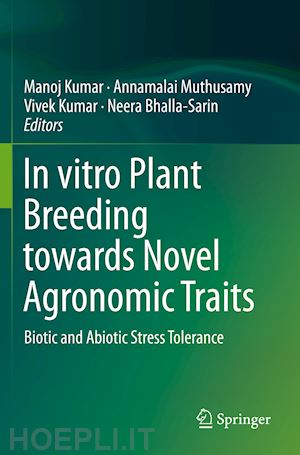
Questo prodotto usufruisce delle SPEDIZIONI GRATIS
selezionando l'opzione Corriere Veloce in fase di ordine.
Pagabile anche con Carta della cultura giovani e del merito, 18App Bonus Cultura e Carta del Docente
This book presents a comprehensive overview of plant stresses caused by salt, drought, extreme temperatures, oxygen and toxic compounds, which are responsible for huge losses in crop yields. It discusses the latest research on the impact of salinity and global environment changes, and examines the advances in the identification and characterization of the mechanisms that allow plants to tolerate biotic and abiotic stresses. Further it presents our current understanding of metabolic fluxes and the various transporters that collectively open the possibility of applying in vitro technology and genetic engineering to improve stress tolerance.
Exploring advanced methods that augment traditional plant tissue culture and breeding techniques toward the development of new crop varieties that can tolerate biotic and abiotic stresses to achieve sustainable food production, this book is a valuable resource for plant scientists and researchers.Dr. Manoj Kumar is an Associate Professor at the Department of Life Sciences, Central University of Jharkhand, Ranchi, India. Committed to research and development, Dr. Kumar holds a PhD in Plant Biotechnology and is involved in multidisciplinary research in the area of plant developmental biology, plant-microbe interaction and forest molecular genetics, including as leader of a multidisciplinary research group He is a referee for various journals, including Phytoremediation and the Journal of Soil Sediments.
Dr. Annamalai Muthusamy is currently a Professor and Head of the Department of Plant Science, School of Life Sciences, Manipal University. Prof. Muthusamy has 22 years of academic and research experience in the field of plant tissue culture and in vitro breeding of plants. He teaches UG and PG courses on Plant Biology and Biotechnology, Cell Biology and Recombinant DNA Technology and is also involved in research on in vitro breeding ofplants for biotic and abiotic stress, induction of genetic variability for improved plant secondary metabolites and DNA methylation, metabolomics and bioactive molecules of plants and also is coordinator of the Alumni Centre, SLS, MAHE.
Dr. Vivek Kumar is a agricultural microbiologist with 20 Years of experiences in teaching, research and guidance. Dr. Kumar is currently an Associate Professor at the Department of Microbiology, Himalayan School of Biosciences, Swami Rama Himalayan University, India.
He serves on the editorial board of various respected international journals and is also a peer reviewer. He has published 61 research papers, 19 book chapters, six review articles and two books. For eight years, Dr. Kumar has was Microbiologist at the Department of Soil and Water Research, Public Authority of Agricultural Affairs & Fish Resources, Kuwait.
Prof. Neera Bhalla Sarin is an internationally respected scientist and a consultant for various institutions in India, Europe and Australia. She was also a Professor, and Dean of the School of Life Sciences, JNU, New Delhi. She was the chairperson of several academic councils at University level, has led an international plant developmental biology group and completed numerous research projects sponsored by the Govt of India and international research funding institutions (Indo-Swiss, Indo-Korea, Indo-Australia, Indo-US).











Il sito utilizza cookie ed altri strumenti di tracciamento che raccolgono informazioni dal dispositivo dell’utente. Oltre ai cookie tecnici ed analitici aggregati, strettamente necessari per il funzionamento di questo sito web, previo consenso dell’utente possono essere installati cookie di profilazione e marketing e cookie dei social media. Cliccando su “Accetto tutti i cookie” saranno attivate tutte le categorie di cookie. Per accettare solo deterninate categorie di cookie, cliccare invece su “Impostazioni cookie”. Chiudendo il banner o continuando a navigare saranno installati solo cookie tecnici. Per maggiori dettagli, consultare la Cookie Policy.